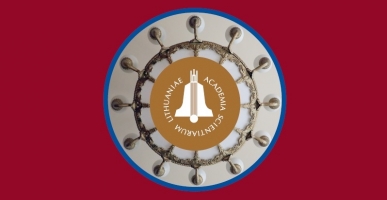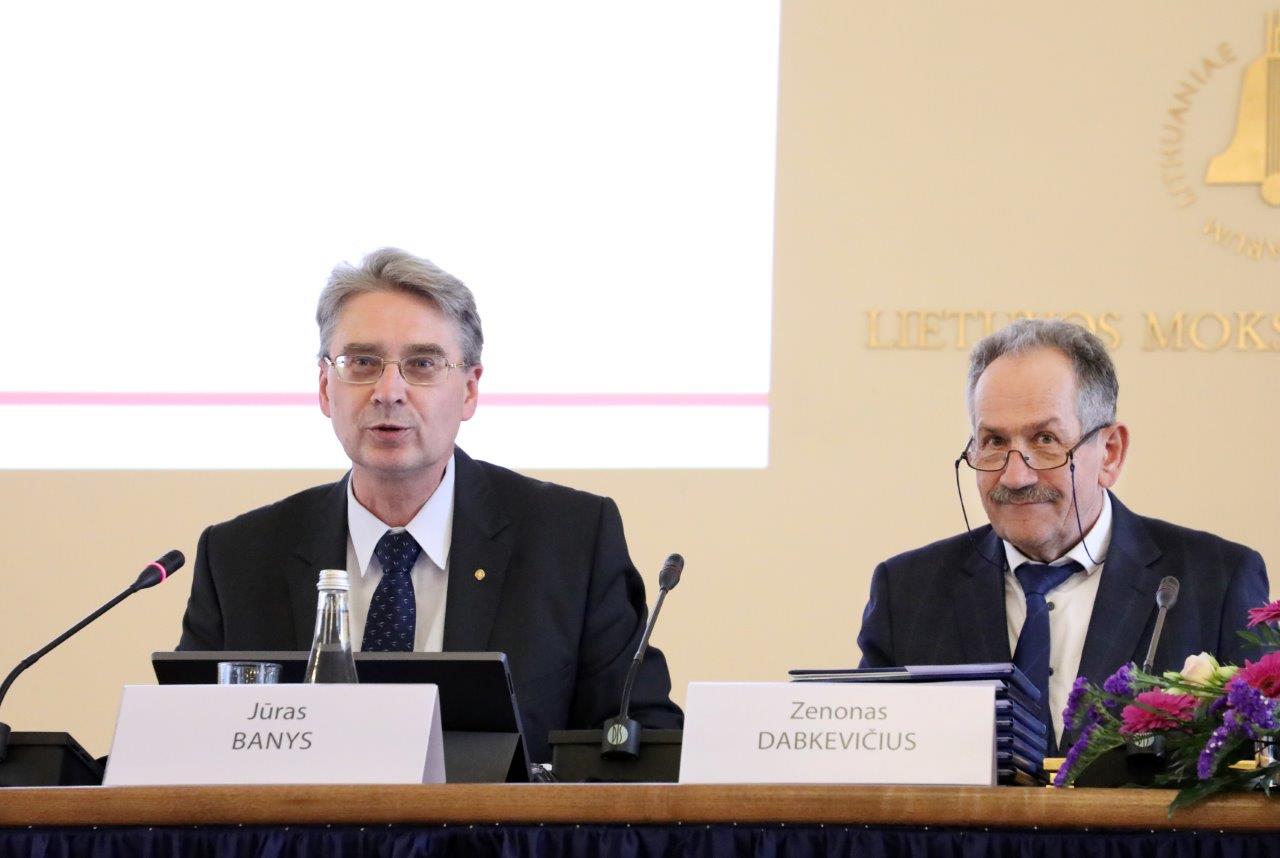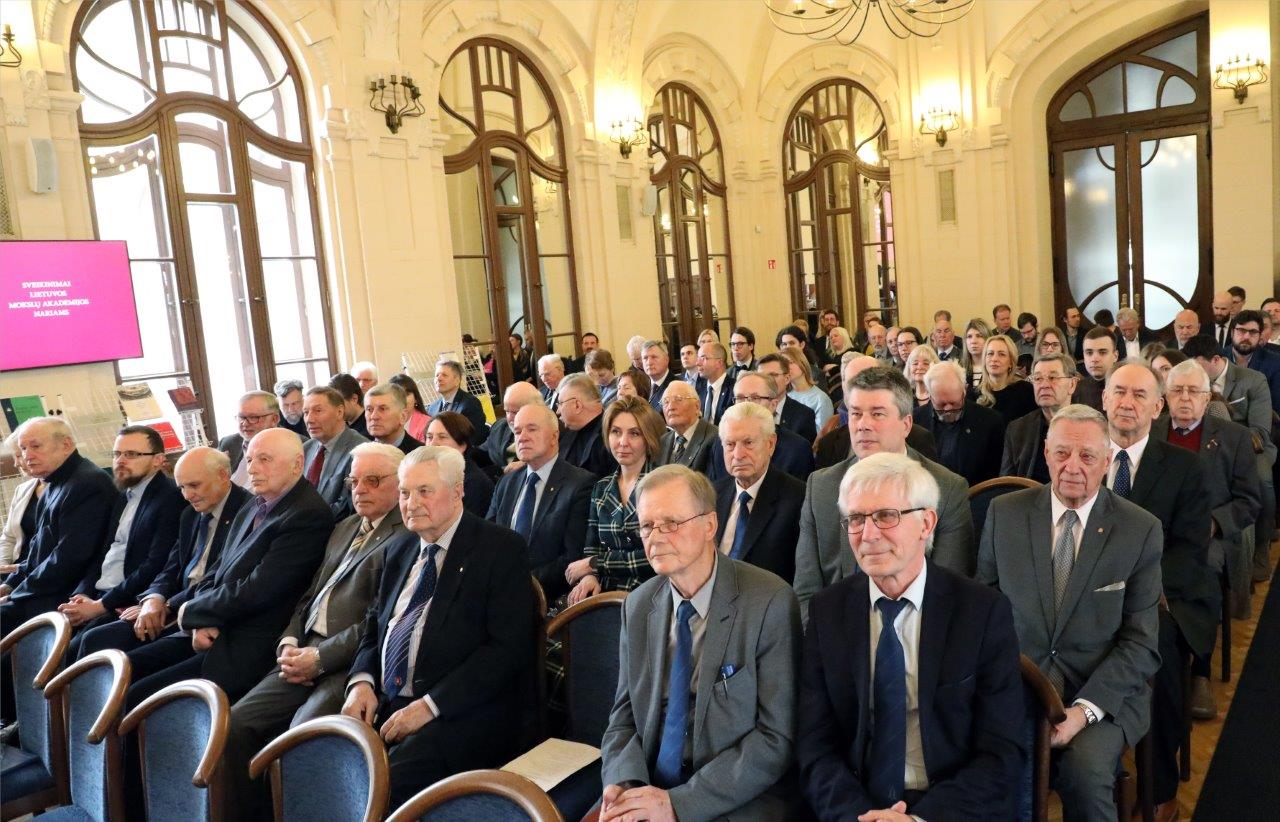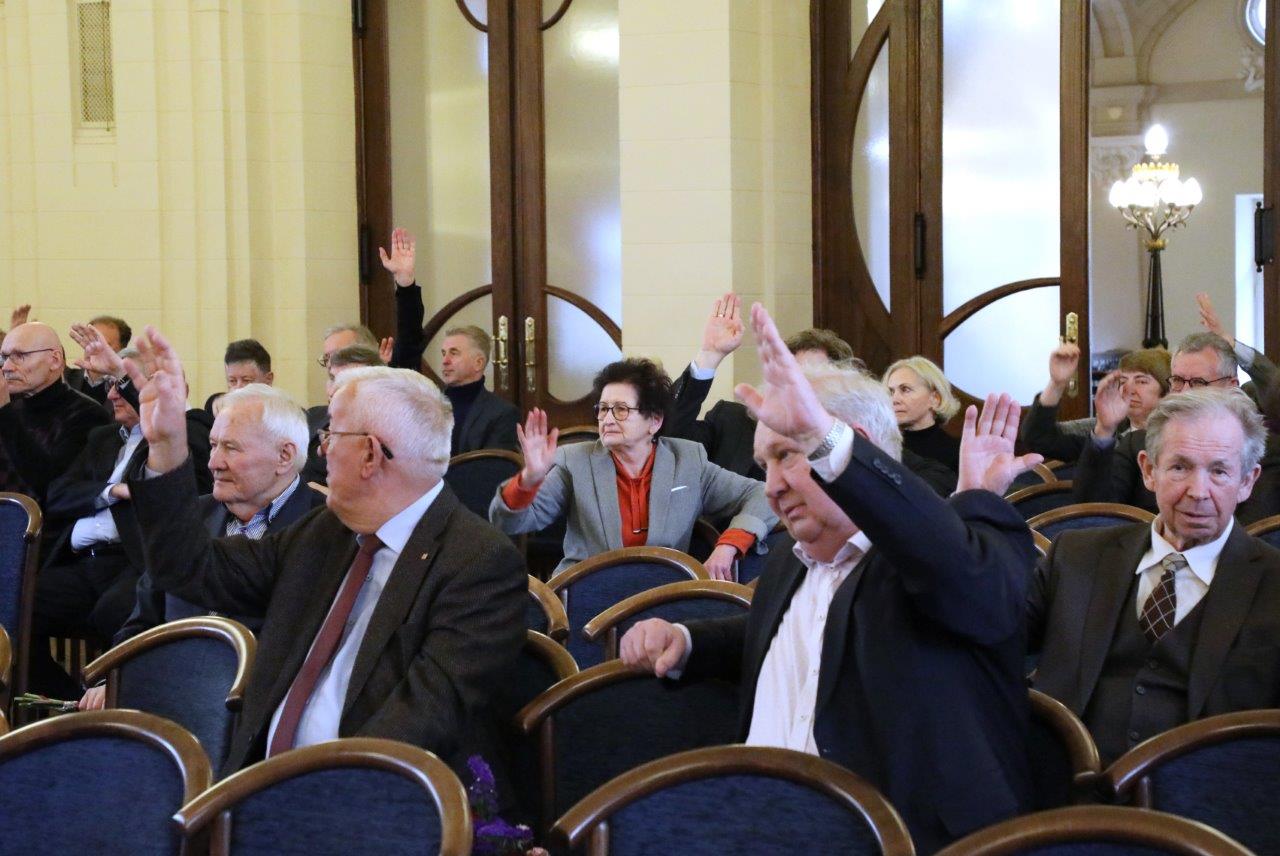Events
General Electoral Assembly of the Members of the Lithuanian Academy of Sciences
11 04 2023
A general electoral assembly of the Lithuanian Academy of Sciences was held on 4 April 2023. Invited guests, among whom were the winners of the competitions organised by the Academy, other awardees, representatives of the National Museum of Lithuania, the State Commission for the Lithuanian Language, and the management of the Wroblewski Library of the Lithuanian Academy of Sciences, attended the event as well.
A minute of silence at the beginning of the meeting was dedicated to the memory of the academician Danielius Eidukas.

Academicians Algirdas Vaclovas Valiulis, Jurgis Kazimieras Staniškis, Rymantas Jonas Kažys, Algirdas Jonas Raila, Sigitas Podėnas, Rolandas Palekas, and Gintautas Žintelis were congratulated on their important jubilees. Commemorative medals of the Lithuanian Academy of Sciences were awarded to academicians Antanas Laurinčikas, Jonas Remigijus Naujalis, Arūnas Krotkus, Jonas Grigas, Algirdas Petras Stabinis, Limas Kupčinskas, and Sigitas Tamulevičius. A commemorative medal was also awarded to the National Museum of Lithuania for its significant contribution to the preservation of the collections of historical values of Lithuania for future generations, for competence development, educational and other activities, and for the cooperation with the Lithuanian Academy of Sciences. It was accepted by Žygintas Būčys, the museum’s deputy director and the chief custodian of the collections.
The winners of the competitions for the prizes established by the Lithuanian Academy of Sciences in memory of outstanding Lithuanian scholars were honoured next. Prof. Jūras Banys, president of the Academy, awarded the diplomas.
Dr Žydronė Kolevinskienė, an associate professor at Vytautas Magnus University, won the Justinas Marcinkevičius Prize in literary studies for her research into the creative work of émigré women and search for identity in the writings of women of the late nineteenth and early twentieth centuries. In her thank you speech, the scholar highlighted the links between Marcinkevičius and the world of women. She quoted the writer Rimantas Kmita’s thought that Marcinkevičius was a ‘soft’, feminine poet, who in his poetry showed convincingly how women embraced the circle of life.
Academician Raimondas Čiegis introduced the achievements of Antanas Laurinčikas, a member of the Lithuanian Academy of Sciences and the winner of the Jonas Kubilius Prize in mathematics. In Čiegis’s words, Laurinčikas is Kubilius’s disciple, a successor to his ideas, and a generator of his own ones. In his work, Laurinčikas investigates the most complex structural issues in mathematics such as the theory of universality of ζ(s) functions.
Prof. Dr habil. dr. Eugenija Kupčinskienė of Vytautas Magnus University, the winner of the Tadas Ivanauskas Prize in nature protection, was awarded for the cycle of research works ‘Environmental Phyto-Indication’. Academician Mečislovas Žalakevičius, who introduced her achievements, noted that the laureate's books and research (e.g., pollutant-induced changes in conifers, plant response to pollutants) are useful for environmentalists, medical doctors, veterinarians, and the wider public interested in plants and their environment. Essentially, plants are sensitive sensors of environmental pollution.
Academician Vytautas Ruzgas, the winner of the Juozas Lazauskas Prize (plant breeding), was awarded the prize for his research study ‘Restoration of winter wheat and rye breeding: paths and results’. He has developed as many as thirty varieties of wheat and rye. The laureate said that this was linked to the work of Juozas Lazauskas and his encouragement to restore rye and wheat varieties in Lithuania. The work was hard, but the harder it was, the more satisfying the results, especially since they were in the public interest.

The ceremony continued with awards to the winners of the Young Scientist and Doctoral Student Research Competition 2022, which was followed with awards to the winners of the Competition of Research by Students in Higher Education 2022. Then Prof. Jūras Banys, president of the Lithuanian Academy of Sciences, invited academician Aivaras Kareiva, chair of the Theodor von Grotthuss Foundation, to award the foundation’s Scholarship Diploma to Gintarė Gečė, a doctoral student at the Center for Physical Sciences and Technology.
The next speaker was Dr Violeta Meiliūnaitė, chair of the State Commission for the Lithuanian Language, who announced the commission’s prizes for the research papers submitted to the competitions of the Lithuanian Academy of Sciences of 2022 written in the most fluent Lithuanian language and the best style. According to Dr Meiliūnaitė, the Commission for the Lithuanian Language is constantly trying to ensure that the Lithuanian language is everywhere. Sometimes we want correct and fluent language, but it often happens that such language is like the lighting in an operating theatre: clear yet cold. Therefore, she was delighted to award two researchers – Eglė Mazgelytė of the Faculty of Medicine, Vilnius University, and Lukas Dvylys of the Faculty of Chemical Technology, Kaunas University of Technology – whose works were written in a language that is not only correct but also has style.
The next item on the agenda was the Annual Activity Report of the Lithuanian Academy of Sciences for 2022, which was presented by Prof. Jūras Banys, president of the Academy. He stressed that as an institution providing expert advice, the Lithuanian Academy of Sciences adopted a number of important resolutions in 2022. The members of the academy were also active in international organisations. Among other activities of the Academy, he mentioned book presentations, discussions (e.g., ‘Semiconductors in Lithuania‘), meetings with foreign ambassadors and Taiwanese research representatives, the European Science Advisors Forum (ESAF), organisation of various competitions and awards, celebration of milestone anniversaries at the Academy, round table discussions (‘Topical Issues of Covid-19’), the days of Punsk rural district and Pakruojis district at the Lithuanian Academy of Sciences, conferences (e.g., ‘The Electoral Code’, ‘Regions and Self-Government in Lithuania", ‘Pranciškus Skorina’), and others. The Young Academy of the Lithuanian Academy of Sciences is successfully expanding its activities. In response to the aggression of the Russian Federation against Ukraine, the Academy has been supporting Ukrainian researchers: it aided in publishing a historical monograph by Ukrainian scholars. In addition, two generators were bought for the National Academy of Sciences of Ukraine with funds donated by the community of the Lithuanian Academy of Sciences. Not long ago, the remaining funds were used to buy two servers, which will soon be transported to the National Academy of Sciences of Ukraine.
At the end of his speech, Prof. Banys said that during the recent visit to Taiwan, he found out about prizes for innovation that this country awards to its young scientists and voiced an opinion that it might be worth establishing a similar prize in Lithuania.
The Academy’s Activity Report for 2022, the report on the use of budgetary funds, and the budgetary estimate for 2023 were approved by consensus and corresponding resolutions were adopted.

The last item on the agenda of the general assembly was the introduction and election of candidates to full and foreign members of the Lithuanian Academy of Sciences. The candidates were introduced by Vytautas Nekrošius, Leonas Valkūnas, Limas Kupčinskas, Vidmantas Stanys, chairs of the scientific divisions of the Academy, and Vytautas Ostaševičius, vice-chair of the Division of Technical Sciences. The following candidates were announced:
Prof. Dr Alvydas Jokubaitis, political sciences
Prof. Dr Evaldas Kazlauskas, psychology
Prof. Dr Darius Abramavičius, physics
Prof. Dr Jonas Šiaulys, mathematics
Prof. Dr Linas Mažutis, biochemistry
Prof. Dr Sonata Jarmalaitė, biology
Prof. Dr Albertas Bitinas, geology
Prof. Dr Rimantas Benetis, cardiac surgery
Prof. Dr Dainius Steponavičius, environmental engineering
Dr Olga Kurasova, informatics
Dr Rolandas Daukševičius, mechanical engineering.
The biologist Prof. Andre Franke (Germany), agricultural scientist Prof. Dr Abdul Mounem Mouazen (Belgium), and materials scientist Prof. Dr Saulius Kačiulis (Italy) were recommended by the scientific divisions and nominated by the presidium of the Lithuanian Academy of Sciences as foreign members of the Academy.
The open vote approved the inclusion of candidates on the secret ballot for the election of full and foreign members of the Lithuanian Academy of Sciences.
The counting of the secret ballot votes resulted in all nominated candidates being elected. Respective resolutions of the general assembly of the members of the Lithuanian Academy of Sciences were adopted.
Prepared by Dr Rolandas Maskoliūnas and Dr Andrius Bernotas
Translated by Diana Barnard
